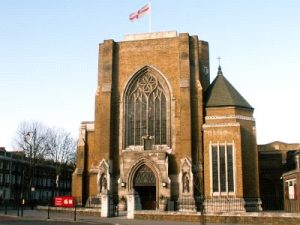 The second SSLSO event of 2012 took us to St George’s Roman Catholic Cathedral, Southwark, which occupies the triangle of land between Westminster Bridge Road, St George’s Road and Lambeth Road. The cathedral was designed by Augustus Pugin and opened in 1848. However, it suffered severe bomb damage in 1941, and was eventually re-opened in 1958. London Transport enthusiasts will be well aware that the cathedral is directly opposite the London Road depot, which is used to house Bakerloo Line rolling stock!
The second SSLSO event of 2012 took us to St George’s Roman Catholic Cathedral, Southwark, which occupies the triangle of land between Westminster Bridge Road, St George’s Road and Lambeth Road. The cathedral was designed by Augustus Pugin and opened in 1848. However, it suffered severe bomb damage in 1941, and was eventually re-opened in 1958. London Transport enthusiasts will be well aware that the cathedral is directly opposite the London Road depot, which is used to house Bakerloo Line rolling stock!
The cathedral organist, our member Norman Harper, had first proposed the idea of a SSLSO visit to Southwark early in 2011. Gradually, the idea of a short organ recital and improvisation workshop took shape, and after securing the services of four volunteers for the masterclass, we were ready to go ahead.
On our arrival at the cathedral we were met by Norman, who welcomed us and provided us with notes which would form the basis of the improvisation masterclass. Norman then gave a brief introduction to the afternoons’ proceedings before commencing his recital on the 19-rank 72-stop John Compton organ of 1958. His programme was as follows:
Henry Purcell – Rondeau and Minuet from Abdelazer (or The Moor’s Revenge)
J.S.Bach – Vor deinen Thron tret’ ich allhier BWV 668
Messiaen – Apparition de l’Eglise éternelle
Howells – Rhapsody in d flat Op 17 No 1
Peeters – Scherzo and Toccata (Suite Modale)
Improvisation on a submitted theme
After the Peeters Scherzo and Toccata, Norman was warmly applauded for his excellent playing. I then handed him a piece of manuscript paper on which I had hastily scribbled the principal theme from “The Dance of the Cuckoos”, better known to most as the theme music from Laurel and Hardy. After demonstrating the theme on a quiet flute, Norman then produced a brilliant improvisation which was much appreciated by all present.
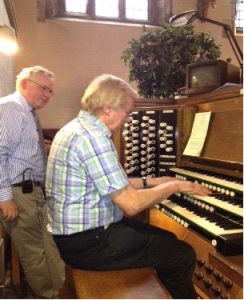
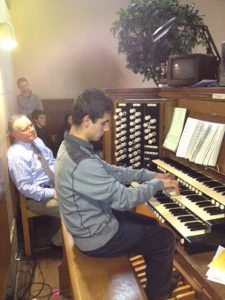 After Norman had concluded his recital, we were invited to gather around the organ console to observe a short improvisation masterclass. Four students – Martin Callingham, Nicholas Mannoukas, Dorothy Tang and Charlie Warren – were then put through their paces by Norman. Each student was asked to improvise for a while, after which Norman gave constructive advice on how to avoid certain pitfalls. Most common among these were using too many long held pedal notes, getting stuck in the same key, and using only the mid-range of the manuals. As Norman pointed out, John Compton provided 61 notes on the manuals at Southwark, and he probably intended all of them to be used! Other ideas were explored, such as using unusual registrations – playing chords in the bottom octave of the Choir Clarinet 8’ was a good case in point. Other advice included putting hands and feet down randomly, and having the confidence to “go with it”, as well as going to a held unison or octaves if stuck in a rut. It was interesting to hear each student trying these ideas out, and even in the limited time available they all appeared to grow in confidence. I suspect more than one congregation in South London was treated to a few new ideas the following day!
After Norman had concluded his recital, we were invited to gather around the organ console to observe a short improvisation masterclass. Four students – Martin Callingham, Nicholas Mannoukas, Dorothy Tang and Charlie Warren – were then put through their paces by Norman. Each student was asked to improvise for a while, after which Norman gave constructive advice on how to avoid certain pitfalls. Most common among these were using too many long held pedal notes, getting stuck in the same key, and using only the mid-range of the manuals. As Norman pointed out, John Compton provided 61 notes on the manuals at Southwark, and he probably intended all of them to be used! Other ideas were explored, such as using unusual registrations – playing chords in the bottom octave of the Choir Clarinet 8’ was a good case in point. Other advice included putting hands and feet down randomly, and having the confidence to “go with it”, as well as going to a held unison or octaves if stuck in a rut. It was interesting to hear each student trying these ideas out, and even in the limited time available they all appeared to grow in confidence. I suspect more than one congregation in South London was treated to a few new ideas the following day!
After the improvisation workshop, SSLSO members were invited to play the cathedral organ for themselves. Although very loud close-up, in the main body of the cathedra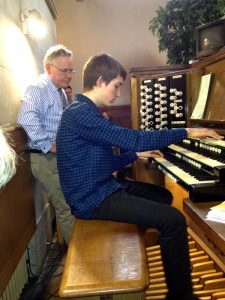 l the organ produced
l the organ produced 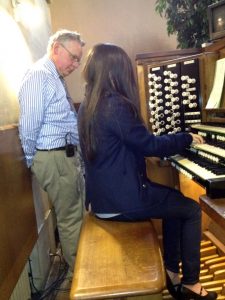 a well-balanced sound with plenty of 16’ tone on the pedals. The swell strings were suitably ethereal, and it was interesting to note that the swell Cymbale III is extended from the Viola da Gamba 8’. Similarly on the choir organ, the Tierce 1 3/5’ is extended from the Vox Angelica 8’. Other interesting stops were the 16’/8’/4’ Bombarde/Tuba/Tuba Clarion rank (very popular with some members!), the 32’ polyphoned Sub Bass, and the Harmonics 32’ which gave a very passable imitation of a 32’ pedal reed. Even more remarkable is the fact that this particular stop is comprised of wide-scaled flutes. My own experience of extension organs had been confined to small instruments, where the tonal deficiencies caused by too much extension from a small number of ranks were all too obvious. Hearing this instrument was an education, and showed how effective a well thought-out extension organ can be.
a well-balanced sound with plenty of 16’ tone on the pedals. The swell strings were suitably ethereal, and it was interesting to note that the swell Cymbale III is extended from the Viola da Gamba 8’. Similarly on the choir organ, the Tierce 1 3/5’ is extended from the Vox Angelica 8’. Other interesting stops were the 16’/8’/4’ Bombarde/Tuba/Tuba Clarion rank (very popular with some members!), the 32’ polyphoned Sub Bass, and the Harmonics 32’ which gave a very passable imitation of a 32’ pedal reed. Even more remarkable is the fact that this particular stop is comprised of wide-scaled flutes. My own experience of extension organs had been confined to small instruments, where the tonal deficiencies caused by too much extension from a small number of ranks were all too obvious. Hearing this instrument was an education, and showed how effective a well thought-out extension organ can be.
The afternoon was well-attended, and it was good to meet old friends as well as our newest member, Anne Willson. Thanks are due to Martin, Nicholas, Dorothy and Charlie for volunteering to take part in the improvisation workshop, and especially to Norman for giving so generously of his time and talent, and also for reminding me just what a fine composer Flor Peeters was. It seems to me that we don’t hear his music often enough these days, which is a great pity.
Graham Powell

